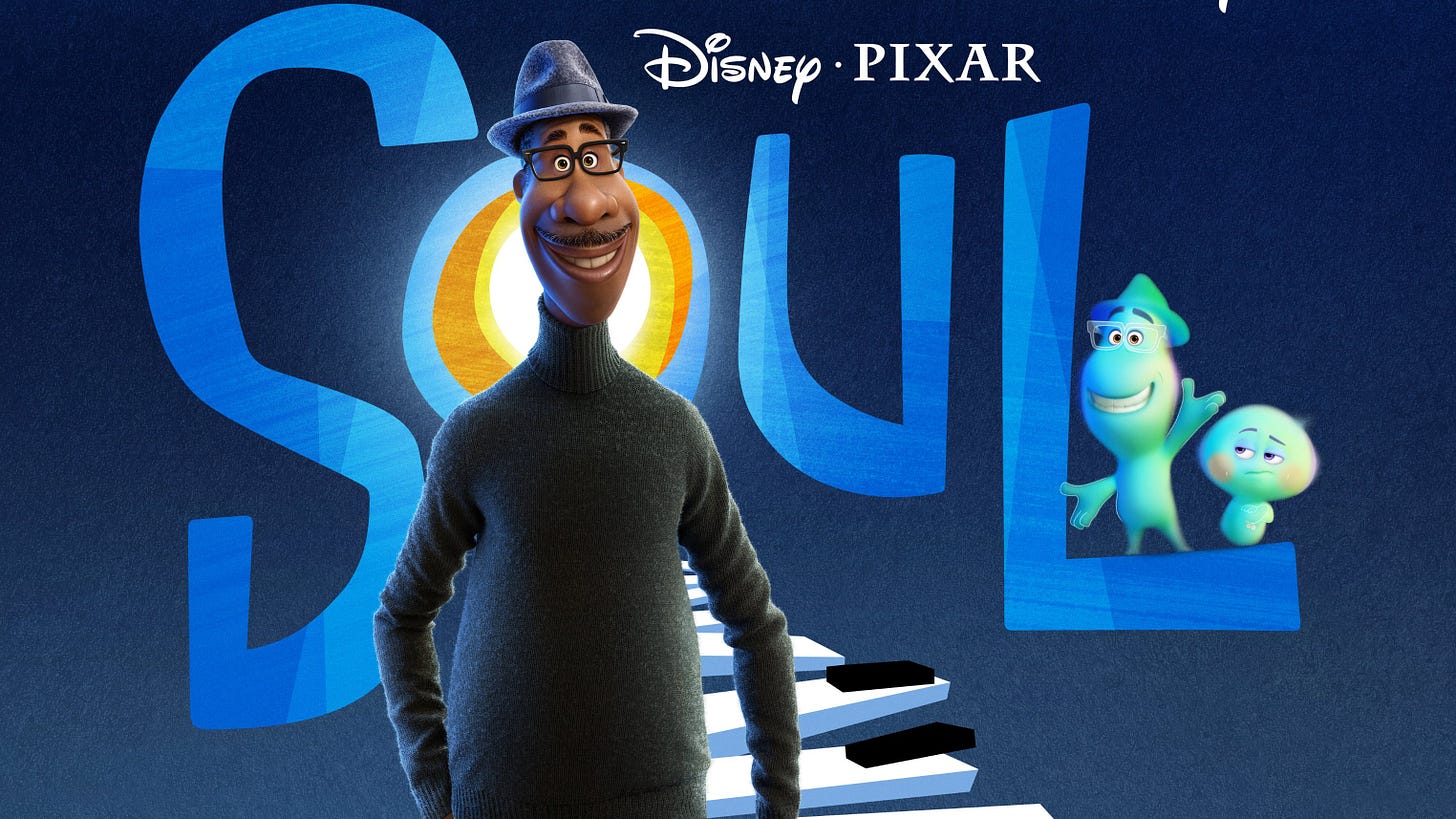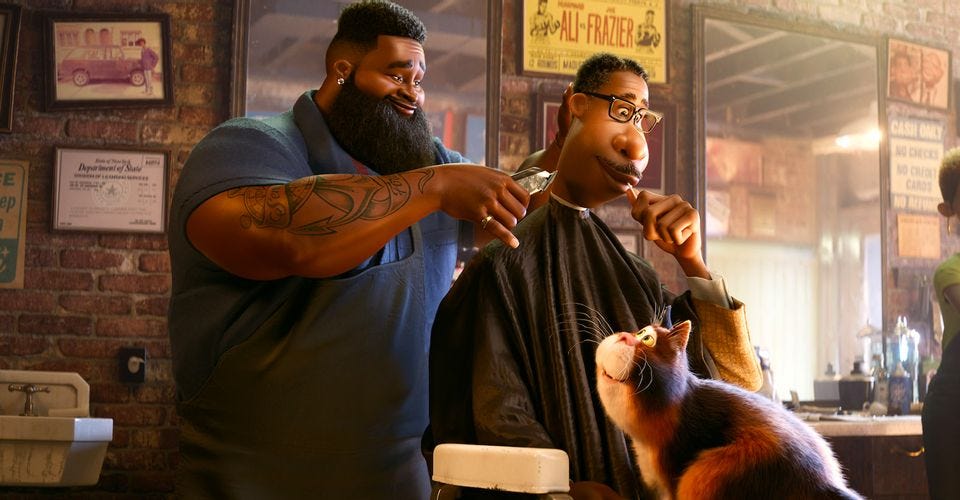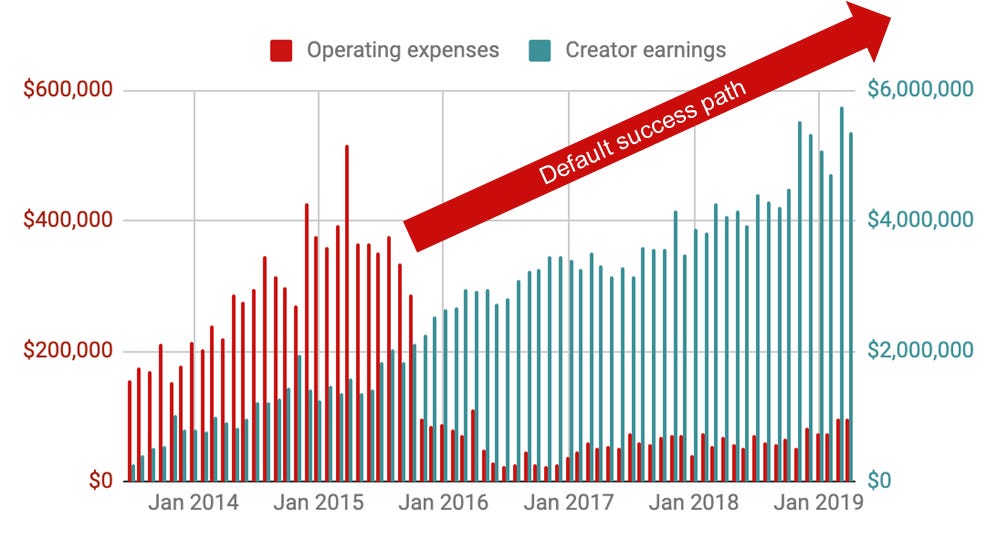Pixar's Soul on Life's Purpose & Gumroad's Anti-VC Playbook | #123
Do we have a purpose? Gumroad as the first post-work company?
January 9th, 2020: Welcome to 85 new subscribers and hello to the 3,192 readers from across the world, especially the 35% of you that open this e-mail each week. Thanks for all the thoughtful reflections on last week’s e-mail. It’s always great to hear more from you. Keep the e-mails coming and here’s looking forward to a healthy (fingers crossed) 2021!
👉 I wanted to give a boost to Andrew Taggart’s 4-week course “Escape Total Work” that he is running in February. He has helped hundreds of people contemplate meaning in their lives through the lens of work. Learn more here (I have no stake in this course other than wishing Andrew the best).
📚 I wanted to start adding a little bit of additional content for the growing number of paid subscribers. Here is a post of the 35 books I read in 2020 and a short reflection of each. I am planning on adding additional paid posts but the weekly Saturday reflection will remain unchanged.
#1 What Soul can teach us about work & life
(Spoilers ahead…)
I watched Disney’s “Soul” this past week and found it provocative.
Throughout the movie I was expecting the ending to have a revelation about pursuing your passion but was intrigued and surprised by the slightly different message.
Throughout the movie there is a soul, #22 as they call him, that has not yet come to live on Earth because he can’t find his “spark.” She and the main character, Joe, are operating under the assumption that this spark is something like a calling or profession that needs to be found.
Yet after following Joe throughout the movie he has changed his mind. This revelation comes after he finally lands a gig playing in a Jazz band. Yet upon realizing he has achieved his dream he finds himself a bit lost.
“I thought I’d feel different.”
This is a surprisingly common phenomenon. The hard part of taking it serious is that people express this realization after they have reached some clear marker of success.
Consider Kevin Durant, who was not as happy as he expected after winning the NBA title. His friend Steve Kerr reported,
He was searching for what it all meant. He thought a championship would change everything and found out it doesn’t. He was not fulfilled.
So we pursue our goals anyway. We tell ourselves, “they can say that because they’ve already made it.” For me I thought my goal was to break into consulting and then go to a top business school and then, well, I kind of ran out of things to pursue.
This is why I’m wary of goals. I try to keep it simple and find things that I like to keep doing at a small scale and that seem to make my life better like writing.
But I’m not sure if you can get to this state without going through the confusing state of receiving your perceived goal and then trying to figure out whats next.
It seems we all need to go through a first chapter in our lives in which we seek to become somebody. Then the challenge shifts to letting go of that identity without destroying your life and while still keeping the things you learned along the way. All of this is damn hard and I’m not sure there are shortcuts.
Joe offers #22 his reflections on this experience towards the end of the movie:
“Your spark isn’t your purpose, that last box fills in when you are ready to come live”
Beyond just applying to #22 it applied to Joe as well.
He realizes this as he observes his body in the barbershop (now inhabited by 22) and for the first time they talk about something other than his attempts to become a successful Jazz musician or his continued failure to do so.
As they walk out of the barbershop, the barber mentions that it was nice to talk about something other than Jazz for once.
Damn that must have been tough to hear.
Joe was obsessed with his own success or lack thereof and it undermined many of the relationships in his life.
Viktor Frankl touched on this in his famous book, Man’s Search For Meaning, “Don't aim at success. The more you aim at it and make it a target, the more you are going to miss it.”
Aim at things that matter to us but don’t forget that its not the point. Figuring out the point of everything may be a deeper, harder, question but for me I find a lot of meaning in just continuing to ask it.
#2 Is Gumroad Building a Post Total Work Company? (link)
Gumroad is an interesting company. Led by Sahil Lavingia, he has detailed how he took funding and tried to follow the VC path of scale at all costs in 2013-2015. They were never able to reach fast enough rates of growth and they “failed.” So he laid off all the employees and started from scratch.
Underneath everything, he had still built something that was useful and could be profitable with a different structure. So instead of following the standard playbooks for starting a he set out to to (re)build a company he wanted to keep running, starting with with a couple of key design constraints:
Because I was burned out and didn’t want to think about working any more than I needed to, I instituted a no-meeting, no-deadline culture.
For me, it was no longer about growth at all costs, but “freedom at all costs.”
The reality of most startups is that the culture is downstream of the personality of the founder. Anyone who has worked at a startup knows this and can tell you how much time people at the company spend talking about that founder’s quirks.
This is what makes Gumroad so interesting. Sahil rejected a deep implicit assumption about how work has to be. Namely, that you always need to work more and that work, especially when you are building a startup, is the most important thing in life. Similar to the above lesson from Soul, however, he learned this the hard way, going from:
From 2011 to 2016, building Gumroad was my singular focus in life.
to this:
But today, it is just a part of my life, like a hobby might be. For example, I paint for fun, and every once in a while, I sell a painting.
It’s one thing to say these things and claim it is the culture of a company but what is more impressive is that they designed it into the operating model of the company. Consider:
They only hire contract employees
They clearly signal that this may not be a great place for career path progression
They have incentives that discourage overwork (“We also have an “anti-overtime” rate: past twenty hours a week, people can continue to work at an hourly rate of 50 percent.”
I’ve been excited to see the emergence of these kinds of “calm” companies. Some people may think think I am against working long hours. It’s not for me but I also think people should be able to work as much as they want. Most knowledge workers have more freedom to design those hours than they imagine.
But for many people who may want to orient around things outside of work, these kinds of companies could be a welcome place to work 20-30 hours a week. I received a nice note from a reader this week, “2020 forced me to just pause and be a dad.”
Here’s to more companies operating from principle and questioning the default path. The default path of success might help you make a lot of money. But it also might end up with you declaring bankruptcy rather than building a lasting company.
#3 Remote Takes
I think this assessment of remote work from Byrne Hobart is spot on mostly because it acknowledges a state of uncertainty about what comes next:
But for many, the verdict will land somewhere in the middle: The office was overrated, but it wasn’t a disaster — worth something, just not the estimated $2.5 trillion of U.S. office real estate it currently takes up. Remote work is viable, but it’s not perfect — and in most cases, it’s far more productive to just get everyone in one room to hash out a problem, especially for early stage companies.
2021 is the year in which we will start to see the outcomes of many natural experiments with remote, hybrid and back-to-the office moves across the world.
I don’t really have a strong opinion about what’s “right” but am curiously watching what happens next…
#4 Extended Break
I read this great post from Edward on the magic of extended breaks:
I’ve been lucky enough to take a few extended vacations, of one month or more, but even after a couple of weeks I notice that my brain starts to change, starts to alight upon new topics or rediscover old subjects of interest. I find myself writing a lot of notes on a whole host of different topics and wanting to explore them further. This is my creative process, liberated by the neocortex now that my mind isn’t wholly occupied by the strain of everyday sustenance, the rat race and the grind. You don’t have to necessarily travel during these times but I believe it is optimal: there’s something about being in new surrounds that aids perspective. In this era, that might even mean journeying an hour from home or simply renting a place in the country for a little while. Every little helps, but I think the biggest gains come when we journey far from home, into different societies and climates.
#5 Don’t Follow Your Passion, Work In The Corporate World First
I’m a big fan of working in the corporate world. Yet people seem to mistake me writing about the flaws in the corporate world as saying no one should pursue it.
I think the biggest argument against going solo and pursuing your passion when young is that its just hard to do:
it’s easier to find something that is enjoyable to do with a skill you already have than trying to develop a skill around an interest.
The problem with the corporate world is that if you just go in blind and try to coast I don’t think it will end well. Here are the six benefits I see of working in the corporate world for people who want to still do something like me and carve their own path down the line.
Full-time employment enables you to develop skills you might not have the discipline to develop
Figuring out what you like doing is hard but there are more opportunities in a company than you think
You can get a good understanding of how things happen in modern institutions, including how power works
There are a lot of people that live fulfilling lives and have full-time jobs. You might be one of them.
Building a life off the default path takes time. Stable paychecks enable you to build savings so you can buy more time to figure it out
A lot of jobs are not that hard and you can stay energized by limiting the amount of hours you work
👉 Read the full post here
👋
Thanks for reading this week. If you want to check out more of this type of writing and thinking you can dive through older issues, check out longform posts on my blog, subscribe to the Reimagine Work podcast, or just stick around for next week.
If you’d like to become a supporter of this newsletter you can do so by becoming a monthly patron and also receiving the occasional additional paid post throughout the years or by signing up for some of the products I use and endorse
.











